By Osman Softic
Sarajevo, Bosnia and Herzegovina || 2nd May 2020
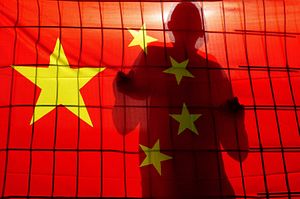 The imminent return of China to the forefront of the world economy, according to Kishore Mahbubani, will not be able to be stopped even by the latest pandemic of the COVID-19. China will continue to grow and strengthen in economic terms, according to this well-known Singaporean diplomat and a former secretary of the foreign affairs of this dynamic and prosperous Chinese-dominated tiny Asian country. Mahbubani, who is of Indian extraction and Hindu by religion, whose ancestors emigrated to the Malay Peninsula from the Sind province, which was split between India and Pakistan after the fall of British colonial rule, is known as one of the biggest mainstream critics of conventional thinking prevalent in the west, which postulates that western domination of the world history will continue unabatedly along the same trajectory as has been the case for the past two centuries.
The imminent return of China to the forefront of the world economy, according to Kishore Mahbubani, will not be able to be stopped even by the latest pandemic of the COVID-19. China will continue to grow and strengthen in economic terms, according to this well-known Singaporean diplomat and a former secretary of the foreign affairs of this dynamic and prosperous Chinese-dominated tiny Asian country. Mahbubani, who is of Indian extraction and Hindu by religion, whose ancestors emigrated to the Malay Peninsula from the Sind province, which was split between India and Pakistan after the fall of British colonial rule, is known as one of the biggest mainstream critics of conventional thinking prevalent in the west, which postulates that western domination of the world history will continue unabatedly along the same trajectory as has been the case for the past two centuries.
Mahbubani recalls that the two largest economies in the world, China and India, have dominated world history and the global economy for the past two millennia, and that 200 years of western domination has actually deviated from conventional historical norms. Today things are slowly returning to their natural position, in accordance with the norms that prevailed in the period before Western domination of the universe. This historical precedent is an aberration, and is slowly disappearing naturally, so it is impossible to forcefully halt China’s growth, according his study titled “Did China Win? The Chinese Challenge to American Supremacy”, a popular book recently published in New York.
Mahbubani argues that the Chinese people have learned from their history the hard lesson that the Chinese nation prospered as a people when their political power was centralized and powerful. While in periods of Chinese history, when China was fragmented, divided and weak, and its central government ineffective, its people experienced humiliation, suffering, poverty and adversity. There is a strong conviction in the collective Chinese consciousness that the period from the first Opium war of 1842 to the proclamation of the People’s Republic of China in 1949 was a century of humiliation. It is this psychological collective awareness that has enabled incumbent Chinese President Xi Jinping to secure support for a strategy that successfully centralized his rule and strengthened the position of head of the Communist Party, effectively making him a lifelong president.
In contemporary political discourse, among theorists of international relations, in the media and think tanks, a thesis recently emerged that a new Cold War and even an armed conflict between the United States and China in the global arena is possible in case China’s unhindered economic growth continues unabated. In order to preserve world domination US could do everything in its power to slow China’s growth and weaken its influence, especially in Southeast and Central Asia, to prevent China in the path of “world domination”, according to leading international relations theorists of structural and offensive realism such as John Mearsheimer, which is gaining in popularity after more than two decades of global domination of liberal hegemony that have been prevalent during unipolar world, or “unipolar moment”, as the American position in the world for the first time was named by political commentator Charles Krauthammer in the National Interest magazine.
 In order to preserve the US status as the only superpower and continue its global dominance; US administration policy has shifted, under President Obama – a change in its global grand strategy – focusing US military, diplomatic and soft power on East Asia. This strategy was officially called ‘pivot to Asia’ or simply a “pivot’. Therefore, an earlier focus of the US military force, much of which apart from Europe and East Asia, as the three major neuralgic points of the global US presence, was concentrated in the Middle East, has been moving farther east toward east Asia.
In order to preserve the US status as the only superpower and continue its global dominance; US administration policy has shifted, under President Obama – a change in its global grand strategy – focusing US military, diplomatic and soft power on East Asia. This strategy was officially called ‘pivot to Asia’ or simply a “pivot’. Therefore, an earlier focus of the US military force, much of which apart from Europe and East Asia, as the three major neuralgic points of the global US presence, was concentrated in the Middle East, has been moving farther east toward east Asia.
When it comes to the Middle East, in addition to a number of other endogenous factors and aspirations of the political elites and population of the region the US imperative to confront China was a key factor that has enabled other, mainly regional powers, especially Iran, Saudi Arabia, Turkey and Israel, in the absence of American vital interest to start vying for leadership in the Middle East. Even Russia itself, although its position in terms of power and influence is still much more significant, but not yet at the level of superpower, was enabled to enter the global stage. Diminishing American interest in the Middle East due to the belief that in the Middle East, Washington no longer has the vital interests that it would be prepared to defend by waging open war has produced a serious vacuum of power over the past decade. This inevitably led to political instability.
This was confirmed by Ambassador Martin Indyk, one of the most experienced US diplomats and foreign policy strategist who has been involved in shaping US Middle East policy for decades, especially during the Clinton administration. In January 2020. Indyk penned an article in the Wall Street Journal to the effect that Middle East no longer paid off, as there were no long-term vital American interests in the region. This experienced and influential foreign policy planner in Washington, although his political views are centrist and policy-oriented along traditional and moderate American perspectives close to Democratic administrations, clearly indicated that America has no vital interests in the Middle East. According to Indyk, America would have to give up its once grandiose ambitions toward this, as he put it “chaotic region”. According to the principles of grand strategy, American policy no longer wants to defeat enemies or change regimes. It is simply satisfied with long-term results, namely that no regional power or group of allied forces (in any kind of alliance) prevails in the Middle East and establish regional hegemony or domination. Such a scenario, which is impossible in today’s constellation of relations, would catastrophically affect the overall US position of a global dominant superpower. US would be able to preserve its preeminent position in the world if it manages to maintain the status quo. That is to guarantee that no potential power with hegemonic aspirations in a given region emerges any time soon in three key regions: Europe, Persian Gulf and East Asia.
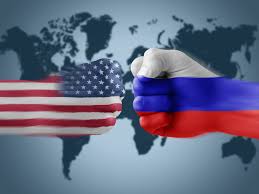 This has been a strategy that informed US global politics ever since it established regional hegemony in the Western Hemisphere with the Monroe Doctrine. Defeating imperial Germany, Nazi Germany, imperial Japan, and later in the Cold War, winning over the Soviet Union; America was resolved each time that it had to defeat countries with regional hegemonic aspirations. Today, China is the only country with the characteristics and capacity to threaten US dominance in East Asia. In this context, we should also look at the new US strategy in Central Asia, which aims at weakening alternative integration models and projects undertaken primarily by China, but also Russia and Iran.
This has been a strategy that informed US global politics ever since it established regional hegemony in the Western Hemisphere with the Monroe Doctrine. Defeating imperial Germany, Nazi Germany, imperial Japan, and later in the Cold War, winning over the Soviet Union; America was resolved each time that it had to defeat countries with regional hegemonic aspirations. Today, China is the only country with the characteristics and capacity to threaten US dominance in East Asia. In this context, we should also look at the new US strategy in Central Asia, which aims at weakening alternative integration models and projects undertaken primarily by China, but also Russia and Iran.
US-India strategic alliance was established along similar rationalization. With participation of Japan and Australia as the backbone of a new US strategy in the Indo-Pacific region (previously known as Asia-Pacific) is aimed at weakening and containing China. Renewal and revitalization of US bilateral relations and agreements with Southeast Asian countries characterized by national and historical pride, but also fears of China, such as Vietnam, aims at mobilizing smaller countries in China’s neighborhood which have disputes with China over the sovereignty of Spratly Islands in the South China sea. Some of these countries openly support Chinese aspirations while others do not want to be involved in conflict with China for a range of reasons and interests conducive to maintaining good diplomatic relations with the giant in their neighborhood.
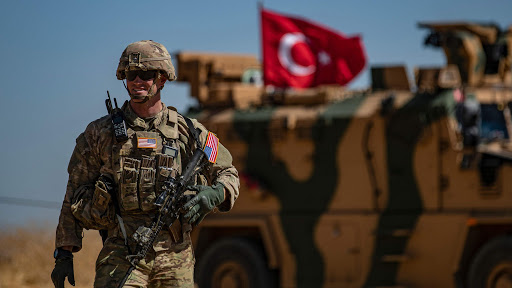
Going back to Middle East, therefore, if we analyze the moves of both Trump and the Obama administrations we will notice that Washington has used all its military, economic, diplomatic and soft power potentials to prevent the advance of Turkish influence in the Arab world. In this regard US collaborated with Kurdish terrorist forces that the US administration itself declared as terrorists. Due to only a partial success of Turkey’s strategy, it was the US goal to break the Turkey’s wings in the Arab world so that its model of democracy coupled with a moderate Islamic “democratism” would not be accepted across the Arab world. Hence analysts see Turkey’s earlier foreign policy strategy as a failure to achieve hegemony in the Middle East.
Accordingly, the US administration did not use all its available means and military arsenal to prevent the dominance of forces in the north of the Levant who were committed to maintaining the status quo. Although hostile to Iran and Russia, which it sees as a weaker rival, as well as adversely oriented towards government in Damascus which US sought to overthrow through a strategy of supporting extremist forces, as evidenced by now documented material known as “Operation Timber Sycamore”, the till, US administration is aware that the presence of Iranian influence in the Levant, no matter how the Iranian regime is despised by Washington, nevertheless represent a good counter balance to check the expanding Turkish influence.
In choosing between confronting potential Turkish hegemony in the Middle East, or Iranian, the Americans have decided to prevent the possibility of both regional hegemons establishing regional dominance. To secure such a policy, Washington had to give concessions to Moscow, which America sees as a guarantee of preventing regional domination of both Turkey and Iran. This is also indicative by the balancing role of Russia, and in particular because of extraordinary good relations between Russia and Israel, for example. Third potential hegemon of the Arab world whose power and influence have declined tremendously over the past decade, that of the Kingdom of Saudi Arabia, realized that the times of direct US military intervention in defense of its geopolitical positions are a thing of the past. Middle East has changed along with American position in it. This was taken care of by the George W. Bush administration, which, knowingly or unknowingly, by unjustified aggression based on false accusations and pretext strengthened the position of the majority Shiites in Iraq. It is US policy that has enabled geopolitical circumstances that have favored the spread of Iranian influence, which Washington today declares to be the “greatest factor of instability” in the Persian Gulf and the Middle East in broader sense.
 This realization prompted Saudi Arabia’s generous commitment over the past decade to rely on radical jihadist Sunni groups, including ISIS, who it mobilized by drawing on legitimacy based on real or perceived injustices of the Baghdad regime against minority Sunnis in Iraq. Saudis tried to shore up its geopolitical position by appealing to Islamic legitimacy in order to create a barrier against the penetration of Iranian influence in the Arab world. Saudis tried to build their discourse by expanding narratives about the fear of the Iranian Shiite Crescent threatening the Sunni Arab world. This in turn escalated a serious sectarian animosity between the minority Shiite and majority Sunni factors. This was strategically and purposefully produced to prevent a potential political emancipation, social and economic progress and political independence of Muslim countries in the Middle East.
This realization prompted Saudi Arabia’s generous commitment over the past decade to rely on radical jihadist Sunni groups, including ISIS, who it mobilized by drawing on legitimacy based on real or perceived injustices of the Baghdad regime against minority Sunnis in Iraq. Saudis tried to shore up its geopolitical position by appealing to Islamic legitimacy in order to create a barrier against the penetration of Iranian influence in the Arab world. Saudis tried to build their discourse by expanding narratives about the fear of the Iranian Shiite Crescent threatening the Sunni Arab world. This in turn escalated a serious sectarian animosity between the minority Shiite and majority Sunni factors. This was strategically and purposefully produced to prevent a potential political emancipation, social and economic progress and political independence of Muslim countries in the Middle East.
Some of the most influential theorists of offensive realism in international relations, among whom John Mearsheimer features prominently today, believe that by the nature of power and the development of relations between world powers, as has been the rule throughout human history, America will not allow China to continue its economic growth because Chinese aspirations will naturally emerge from their region to oppose US military domination the very moment it is strengthened enough. The US as the pre-eminent superpower will not allow. Therefore, Mearsheimer posited that China cannot continue to rise economically in a peaceful setting and it would inevitably come in conflict with America. On this topic, Mearsheimer has delivered a series of lectures around the globe at major academic and strategic planning centers. His ideas have attracted great interest in Russia, China, Turkey and Australia, to name only a few countries.
Leading Australian geopolitical and strategic expert professor Hugh White collided with Mearsheimer in August at the Canberra Center for Independent Studies, arguing that it would be a good idea for America and China to find a compromise and agree on joint cooperation, and that the best solution is for them to share power in Asia so that there is no military confrontation with fatal, even nuclear consequences. Professor White is convinced that should there be a conflict between US and China, the US cannot win in that conflict. Therefore, this longtime architect of Australian strategy advocates caution by proposing thus far unthinkable idea, at least for the mainstream Australian defense strategist that Australia, while protecting its national interest in this potential conflict should therefore remain neutral in order to safeguard its national interest.
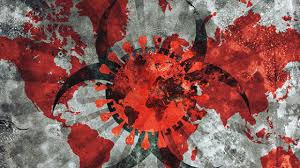 Coronavirus COVID-19 spread globally and caught even the richest countries, those with the most sophisticated health systems, by surprise, as they were unprepared for it. Since COVID-19 first appeared in China, there has been increasing dissatisfaction with China, and even harsh criticism in many western countries directed against China. Western countries are accusing China of hiding information about the virus. Leading countries, such as Germany, United States, Australia and others, are demanding China’s monetary compensation for economic damages already caused by the pandemic, which is estimated to reach trillions of dollars. Italy’s Prime Minister Giuseppe Conte, who had previously favored China, went a step further and declared China’s behavior to spread the virus a “war crime”, of course, if Beijing’s responsibility for spreading the virus was proven. In addition, western countries, on the other hand, are accusing China of deliberately exploiting the pandemic by using it for propaganda purposes, touting the effective and successful measures it has taken to combat it in Wuhan and China in general, in order to better position itself in the world as a “future global leader”.
Coronavirus COVID-19 spread globally and caught even the richest countries, those with the most sophisticated health systems, by surprise, as they were unprepared for it. Since COVID-19 first appeared in China, there has been increasing dissatisfaction with China, and even harsh criticism in many western countries directed against China. Western countries are accusing China of hiding information about the virus. Leading countries, such as Germany, United States, Australia and others, are demanding China’s monetary compensation for economic damages already caused by the pandemic, which is estimated to reach trillions of dollars. Italy’s Prime Minister Giuseppe Conte, who had previously favored China, went a step further and declared China’s behavior to spread the virus a “war crime”, of course, if Beijing’s responsibility for spreading the virus was proven. In addition, western countries, on the other hand, are accusing China of deliberately exploiting the pandemic by using it for propaganda purposes, touting the effective and successful measures it has taken to combat it in Wuhan and China in general, in order to better position itself in the world as a “future global leader”.
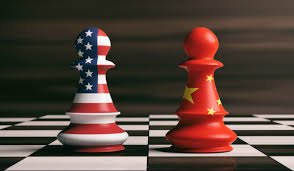 On the other hand, China’s pandemic measures have been praised by some of the world’s leading political leaders, including Turkish President Erdoǧan, as well as leaders of Islamic republics of Iran and Pakistan. Some analysts believe that China will be able to improve its global standing in an inevitable geopolitical repositioning after COVID-19 pandemics. China’s global influence may become more advantageous than that of the US and the West in the broad sense. Others however, believe that America’s power and resilience should not be underestimated given its technological superiority and political legitimacy over China. Josep Borrell, European Union’s High Representative for Foreign Affairs, described China’s efforts as a “race for influence by spinning off the so-called generosity policies”. In Africa, where China has formidable influence, stories of alleged Chinese racism towards Africans living in China, have been rapidly spreading.
On the other hand, China’s pandemic measures have been praised by some of the world’s leading political leaders, including Turkish President Erdoǧan, as well as leaders of Islamic republics of Iran and Pakistan. Some analysts believe that China will be able to improve its global standing in an inevitable geopolitical repositioning after COVID-19 pandemics. China’s global influence may become more advantageous than that of the US and the West in the broad sense. Others however, believe that America’s power and resilience should not be underestimated given its technological superiority and political legitimacy over China. Josep Borrell, European Union’s High Representative for Foreign Affairs, described China’s efforts as a “race for influence by spinning off the so-called generosity policies”. In Africa, where China has formidable influence, stories of alleged Chinese racism towards Africans living in China, have been rapidly spreading.
The Western narrative also highlights examples of more successful measures to curb COVID-19 in democratic countries such as South Korea and Taiwan who are perceived by China as western protégés. Unless the mutual accusations of America and China cease, one thing is certain, If they sink, America and China will sink together. This is why the coming “cold war” exacerbated by the COVID-19 pandemic has to be replaced by diplomacy of peace and cooperation, as soon as possible. If a new cold war becomes an armed conflict, this may well be the end of modern human civilization we know.
 Osman Softic is a Senior Research Fellow at the Islamic Renaissance Front. He is a graduate of the Faculty of Islamic Studies at the University of Sarajevo and obtained his Master’s degree in International Relations from the University of New South Wales. He was named Ambassador for Peace by the Universal Peace Federation and served as a secretary of the Islamic Council of NSW in Sydney.
Osman Softic is a Senior Research Fellow at the Islamic Renaissance Front. He is a graduate of the Faculty of Islamic Studies at the University of Sarajevo and obtained his Master’s degree in International Relations from the University of New South Wales. He was named Ambassador for Peace by the Universal Peace Federation and served as a secretary of the Islamic Council of NSW in Sydney.

